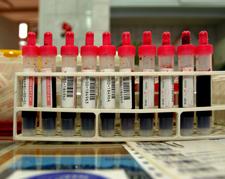The Conservatives have endorsed a policy that would allow emergency workers to apply for forced testing of people for HIV and other infections, regardless of the person’s privacy rights. But critics say such a policy is unnecessary and merely perpetuates HIV stigma.
At the Conservative Party of Canada policy convention Nov 15-16, delegates passed resolution P-110, which says that the government should work with provinces to amend labour codes so that emergency workers (police, firefighters and paramedics, for example) have the right to know when they have been exposed to “infectious diseases” — a right that “will transcend the privacy rights of the infected individual.”
Alison Symington, senior policy analyst at the Canadian HIV/AIDS Legal Network, says the resolution sounds a lot like forced-testing laws already in effect in Ontario, Manitoba, Alberta, Nova Scotia and Saskatchewan.
“It’s a completely exaggerated response,” she says. “It’s based in panic and fear.”
In provinces with forced-testing laws, a front-line worker can apply for a testing order if they came into contact with the bodily fluid of another person.
But the Legal Network says the risk of transmission is very low. There has been only one definite case of occupational HIV exposure in Canada in 25 years, they say.
The rationale behind forced testing is that an exposed person should know whether a source person is infected, to relieve uncertainty, and so they can know whether to start or continue post-exposure treatment. But those results aren’t conclusive — a negative test result doesn’t mean the source person is uninfected, because he or she could be in the incubation period before the virus can be detected.
The Legal Network also notes that the act of performing a medical procedure on someone without their consent sets a dangerous precedent. Forced testing also violates a person’s right to privacy — once the results of the test are passed on to the exposed person, the source person loses all control over personal medical information. That leaves them open to possible HIV discrimination, says the Legal Network.
Symington also found the Tory resolution odd, because the Conservatives previously tried to introduce forced testing, but Parliament decided that it was within provincial jurisdiction.
In 2002, Conservative MP Chuck Strahl introduced private members’ Bill C-217, which would have put forced testing in the Criminal Code. The Commons justice committee heard criticism from many groups, including the Canadian Bar Association, Health Canada, the Department of Justice, and AIDS and civil liberties groups.
Parliament also heard from privacy commissioner George Radwanski on the bill.
“Compulsory blood testing of ordinary law-abiding citizens is a privacy violation so enormous that I find it out of all proportion to a problem whose size hasn’t even been demonstrated, and to its very questionable effectiveness as a solution in any event,” Radwanski told the justice committee.
Instead, he noted less-invasive alternatives: a continued reliance on voluntary consent to testing and improving workplace education to prevent exposure.
During committee debates, Strahl used false statements about hep C transmission.
“If you’ve been exposed to hepatitis C, it may well change what you do when you go home that night with the rest of your family — whether or not you kiss your kids good night or whether you put a mask on before you do so,” he told the justice committee
At the time, Glen Hilson, chair of the BC Persons with AIDS Society, noted that gays would be singled out.
“We fear that this act promotes the vilification of persons living with HIV,” he said. “On whom will the forced blood tests be imposed? It will be those individuals in high-risk groups for HIV: injection drug users, sex trade workers, and gay men.”
The federal government abandoned C-217 in committee, noting that it wasn’t within their jurisdiction. They pledged to work with the provinces, and as of 2008, five provinces have forced-testing laws.
When the Manitoban legislature debated forced testing earlier this year, committee discussion abounded with fear and misinformation.
At an Apr 19 committee hearing, Alex Forest of the United Fire Fighters of Winnipeg read a statement by a firefighter who came in contact with blood of a gunshot victim. The firefighter started post-exposure treatment, but he said he was scared of passing on a virus to his family.
“Imagine being scared to hug your kids or kiss your wife!” he said in his statement, even though HIV or hep C cannot be passed on through kissing or hugging.
In Manitoba, if a person does not submit to a forced blood test, they may be fined $10,000 or face a jail term of six months. If they refuse for more than one day, they can be charged with a separate offence for each day they refuse to get tested.

 Why you can trust Xtra
Why you can trust Xtra


